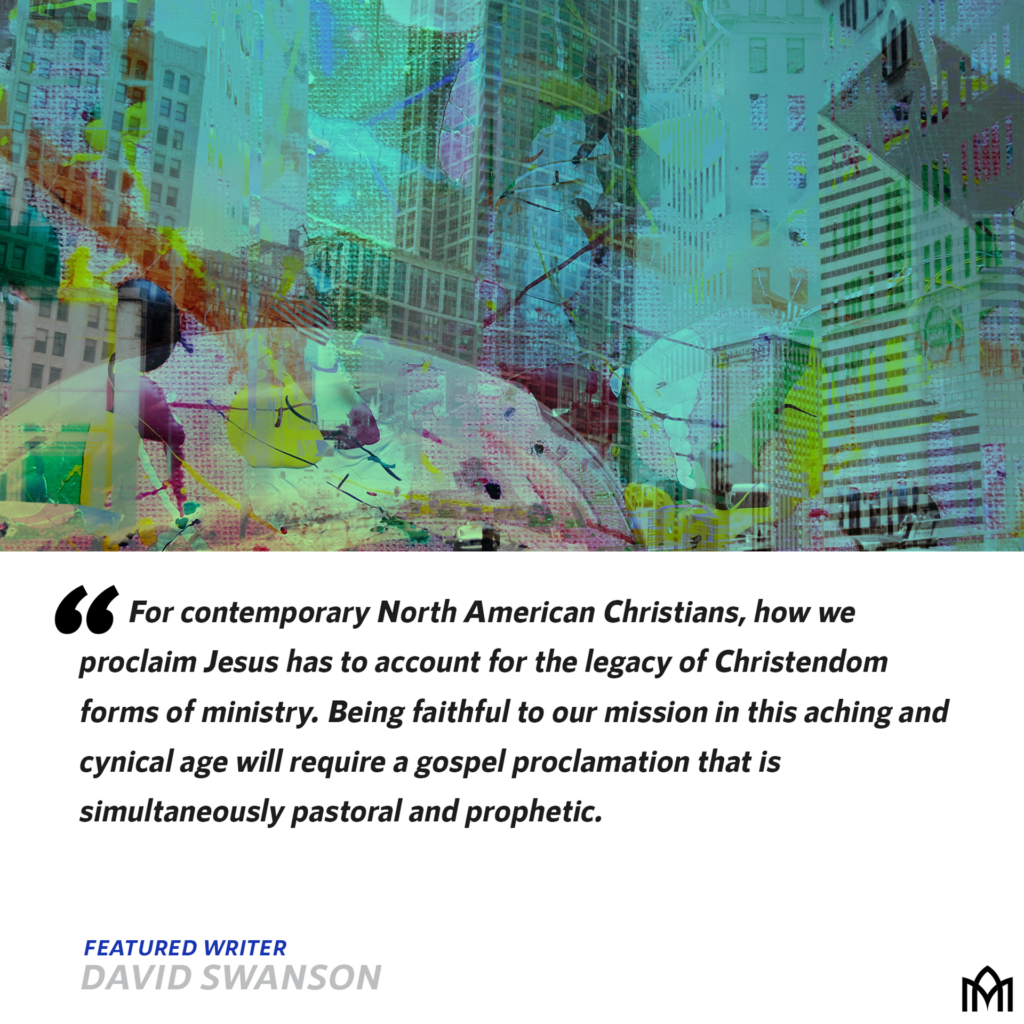Faithful Mission Through The Chaos (Part 2)
*Editorial Note: The first part of David Swanson’s piece, Faithful Mission Through the Chaos (Part 1), was published yesterday. Prayerfully reflect upon how the Holy Spirit is inviting you to respond to David’s call to faithful mission in seasons of chaos. ~CK

- Committing Locally and Inter-culturally
Western Christians have often thought about mission as happening somewhere else, often a continent or an ocean away. But the frontiers to be crossed by Christian mission are not just geographical, as René Padilla pointed out; they also include “cultural, racial, economic, social, [and] political”1René Padilla, quoted in https://lausanne.org/occasional-paper/holistic-mission-lop-33. boundaries. This means each church, without ever leaving its place, can engage in mission.
While there will always be those sent to join God’s mission elsewhere in the world, most of the women and men who make up a church will pursue mission locally. A missional commitment to our particular places becomes increasingly important during times of instability such as we’re living through now. For example, the natural disasters being intensified by climate change – wildfires in Southern California, floods in Appalachia, hurricanes in Florida – leave local communities upended and reeling. Churches that know and love their communities are often among the first to respond to their neighbors’ greatest needs.
For an increasing number of communities, it’s also true that cultural diversity is more common, if no less complicated, than ever. Here on the South Side of Chicago, newly arrived migrants from Central and South America have recently been resettled in the mostly African American part of the city. The complexities of a historically marginalized community, having experienced consistent disinvestment from city government, being asked to welcome these new arrivals by those same city authorities, are many. Despite this, I’ve watched as local churches, led thoughtfully by Black clergy, equip their congregations to care for their newly arrived neighbors even as they continue to advocate for the long-term residents of their neighborhoods.
According to missiologist Al Tizon, to pray as Jesus instructed – “Your kingdom come. Your will be done on earth as it is in heaven” (Matthew 6:10) – “is to commit in the here and now, irrespective of location and context, to the intercultural ‘koinonia’ (fellowship) that characterizes the future of the Triune God.”2Al Tizon, Whole and Reconciled (Grand Rapids: Baker, 2018), 120. Deep roots and intercultural hospitality will mark local churches faithfully engaging in mission in these chaotic days.
A missional commitment to our particular places becomes increasingly important during times of instability. Churches that know and love their communities are often among the first to respond to their neighbors’ greatest needs. Share on X
-
Peacemaking Inside and Outside of the Church
What Robert Schreiter, a priest of the Missionaries of the Precious Blood, lamented about the end of the 20th century applies just as poignantly to the first quarter of the 21st century:
“Now the number of disasters to which relief workers struggle to respond has increased fivefold – and they are nearly all of human fabrication. Previously relief work meant the alleviation of physical human misery. Now it must attend also to the healing of human societies riven by violence and hatred.”3Robert J. Schreiter, The Ministry of Reconciliation (New York: Markyknoll, 1998), 4.
Faithful mission in the context of climate change-fueled disasters, dehumanizing political partisanship, pervasive mass shootings, and antagonizing disinformation campaigns will prioritize peacemaking.
Jesus blesses the peacemakers (Matthew 5:9) even as he exemplifies the scope of the peace we seek: healed bodies, restored outcasts, and chastened powers. In the peace-making example of Jesus, the church finds echoes of the Hebrew concept of shalom, a comprehensive and proactive harmony which includes relationships with God, neighbors, and creation.
To say, as Paul does in Ephesians 2:14, that Jesus is our peace, is to claim the hostile places within a church’s sphere of influence. This begins most intimately within the congregation itself. Having prioritized intercultural fellowship, a church has all the more reason to nurture healthy interpersonal relationships which reflect our friendship with Christ. From there, a local church will acknowledge the many instances of dissension stressing the wider Christian community. Having been siloed by partisanship and ideology and often more easily sorted by societal metrics than by our shared allegiance to Jesus, there are countless opportunities to foster peace within the Body of Christ. For example, Pastor Caleb Campbell, in his attempt to reach Christian nationalists with the gospel, has developed a missiological approach in his book, Disarming Leviathan. Despite having experienced significant personal grief from this corrupt version of Christianity, Pastor Campbell refuses to treat his Christian nationalist neighbors as his enemies, seeking instead to introduce them to the peace-making Jesus.
Having committed to peace in the congregation and broader church, a Christian community on mission will be positioned to seek the peace of their city, suburb, or town. Beginning the practice of peacemaking at home allows our churches to offer practical strategies for reconciliation more widely. Schreiter notes how secular organizations “are turning to the churches to ask them how to bring the resources of their traditions of reconciliation to bear on societies that have been torn asunder by war and violence.”4Ibid., Schreiter, 101. Here in the Bronzeville community of Chicago, our church’s nonprofit organization hosts weekly peace circles for more than two-hundred public high school and elementary school students. Each week they gather in classrooms throughout our neighborhood for the slow and sacred work of tending to their shared reconciliation. In these circles, we are seeking the shalom of our community.
Having prioritized intercultural fellowship, a church has all the more reason to nurture healthy interpersonal relationships which reflect our friendship with Christ. (1/3) Share on X
From there, a local church will acknowledge the many instances of dissension stressing the wider Christian community. (2/3) Share on X
Having been siloed by partisanship and ideology and often more easily sorted by societal metrics than by our shared allegiance to Jesus, there are countless opportunities to foster peace within the Body of Christ. (3/3) Share on X
-
Worshipping Joyfully in All Circumstances
There is much to grieve about the days we’re living through, not least of which are the many ways we have compromised our boundary-crossing mission of representing the holistically transformative gospel of Jesus. As churches become alert to our many accommodations to the false gospels of consumerism, nationalism, partisanship, and others, lament will be one of our faithful responses.
At its best, lament positions churches, especially those who’ve historically experienced cultural privilege, to be attentive to those Christian communities which have never been confused about the incompatibility of the societal status quo to faithful Christian mission. I think, for example, of many of the Black churches in our city who’ve long served their congregations and communities in the face of political apathy and antagonism. These churches and their leaders are not just now waking up to the corrupting character of their country; it’s been an obvious fact for generations. These churches certainly understand the practice of lament – over instances of police brutality, systems of mass incarceration, the economic forces behind gentrification, etc. – but their lament is never without hope. As privileged Christian communities wring our hands about volatility and decline, many of these African American congregations are thriving– calling people to faith, serving their neighbors, and advocating for justice.
After spending time outside of their comfortable contexts with sisters and brothers from marginalized and suffering communities, it’s a common experience for culturally privileged Christians to remark with surprise about the joy they encountered. But why are we surprised? Many psalms reveal God’s people worshipping from their trouble – “I will yet praise him, my Savior and my God” (Psalm 42:11) – and the story of the early church is one in which persecution and anguish couldn’t stop the Christians’ praise. A faith which grows from Calvary’s blood-stained soil cannot help but praise God from deathly valleys and life-threatening storms.
Faithful mission will not ignore the genuine challenges we face in this tumultuous season, but neither will it neglect to joyfully worship the God who is with us always, in every circumstance. And while worship involves much more than singing, I want to suggest that local congregations who are faithful to their holistic mission will raise their joyful praise in song as often as possible. As we sing together, declaring our Savior’s lordship over every principality and power, our perspective will be adjusted. Though it may seem we’re singing in a strange land, the emerging opportunities to be faithful to our mission will become familiar: vulnerable neighbors to love, watersheds to protect, racial inequities to confront, ecumenical partnerships to foster, and the good news of Jesus to share with joy.
Because our circumstances are always changing, the expressions of our church’s mission will necessarily shift. I for one am exceedingly grateful that the mission itself, like the God in whom all Christian mission is rooted, remains the same today as it did for those who came before us, navigating their own chaotic days. May the Spirit give us the wisdom to perceive the boundaries we are to cross in our generation with the holistically transformative gospel of Jesus.
///
There is much to grieve about the days we’re living through, not least of which are the many ways we have compromised our boundary-crossing mission of representing the holistically transformative gospel of Jesus. (1/3) Share on X
As churches become alert to our many accommodations to the false gospels of consumerism, nationalism, partisanship, and others, lament will be one of our faithful responses. (2/3) Share on X
Lament positions churches, especially those who’ve historically experienced cultural privilege, to be attentive to those Christian communities which have never been confused about faithful Christian mission. (3/3) Share on X
*Editorial Note: Our Brave Spaces Newsletter for November 2024, subtitled “All Shall Be Well,” pulled together a ton of our Writing Collective’s recent work on this political moment. Please revisit this newsletter as you navigate today’s presidential inauguration. And please subscribe here if you haven’t already done so! ~CK




